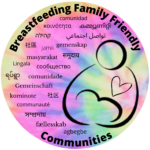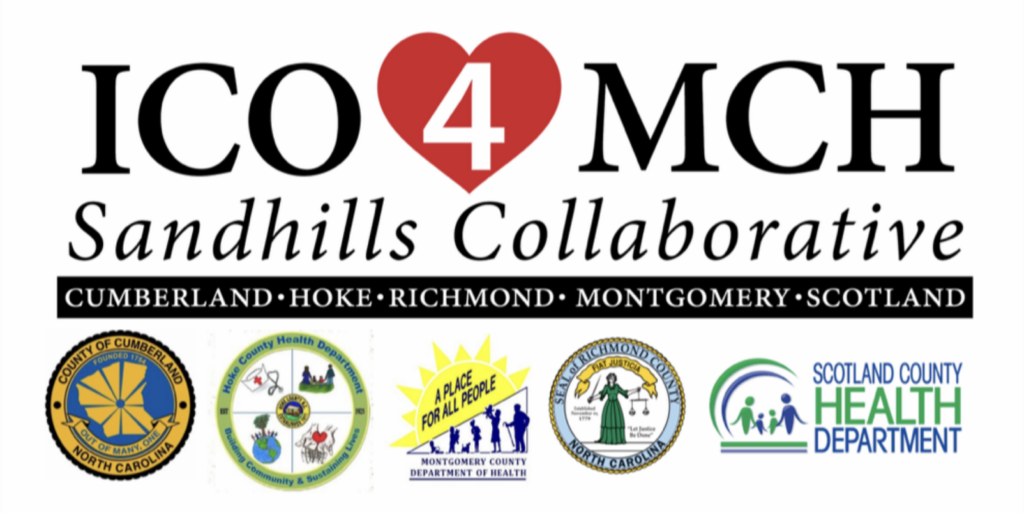A Collaborative Path Toward Breastfeeding Equity
On November 4, 2024, the Sandhills Collaborative review the work in Montgomery, Hoke, Richmond, Cumberland, and Scotland counties for a focused discussion on creating breastfeeding-friendly communities. The meeting emphasized the use of the “Ten Steps to a Breastfeeding Family-Friendly Community” framework, developed by the Carolina Global Breastfeeding Institute, as a guiding tool for advancing breastfeeding support and equity.
Building on Community Strengths
Tammy, representing the Sandhills region, shared her team’s remarkable progress, including the distribution of non-commercial breastfeeding educational materials and securing lactation spaces in schools and daycares. Through partnerships with the Cooperative Extension and the Partnership for Children, childcare providers are receiving the training and resources needed to support breastfeeding families.
Despite these successes, Tammy noted ongoing challenges, particularly the reluctance of some faith-based organizations and businesses to embrace breastfeeding-friendly practices. While providing safe spaces for pumping and feeding is a positive step, she emphasized the need to encourage broader cultural acceptance and active support for breastfeeding.
Promoting Public Breastfeeding Support
A key topic was the importance of creating welcoming public spaces for breastfeeding families. Tammy expressed enthusiasm for introducing “Breastfeeding Welcome Here” signage in parks, libraries, and other public areas. Such visible symbols of support help normalize breastfeeding and assure families that they are valued in the community.
To formalize and celebrate this commitment, the team discussed the power of county commissioner proclamations. These official statements would reinforce the region’s dedication to fostering a breastfeeding-friendly environment and could serve as a cornerstone for National Breastfeeding Month celebrations.
Breastfeeding Education in Healthcare and Academics
Tammy outlined her plans to collaborate with Richmond Community College to incorporate breastfeeding education into curricula for early childhood and healthcare-related courses. By embedding these principles into academic programs, the region can nurture the next generation of professionals who are well-equipped to support breastfeeding families.
Additionally, Love highlighted the free technical assistance available through the North Carolina Department of Health and Human Services for hospitals and clinics seeking breastfeeding-friendly designations. These designations are critical to ensuring that healthcare providers champion breastfeeding through education, policy, and welcoming practices.
Addressing Gaps in Care
The meeting also spotlighted significant gaps in breastfeeding support, including the lack of inpatient birthing facilities at Scotland County Birth Center and long waiting times for tongue-tie treatments. Love and Tammy emphasized the need for consistent, accessible resources and family-centered care to address these challenges.
Next Steps
The Sandhills Collaborative identified actionable goals to enhance breastfeeding support across the region:
- Proclamations: Tammy will lead efforts to secure county commissioner proclamations supporting breastfeeding in all four counties.
- Public Signage: Tammy will work on installing “Breastfeeding Welcome Here” signs in public spaces.
- Educational Materials: Tammy will distribute 500 breastfeeding education resources across the counties, leveraging affordable options from La Publishing.
- Healthcare Partnerships: Expand breastfeeding-friendly hospital and clinic designations.
- Academic Integration: Partner with Richmond Community College to incorporate breastfeeding support into their curricula.
Inspiration for the Future
As the Sandhills region builds on its existing strengths, it serves as a beacon of inspiration for communities striving to create equitable and supportive environments for breastfeeding families. With clear goals and dedicated leaders, the collaborative is making strides toward sustainable change. Recent successes include securing and outfitting dedicated spaces in all four Walmart locations within the collaborative region, as well as at Richmond County Raceway, which will provide Mamava pods for NASCAR race attendees who are breastfeeding or pumping.
Together, we can ensure every family receives the support they deserve.

